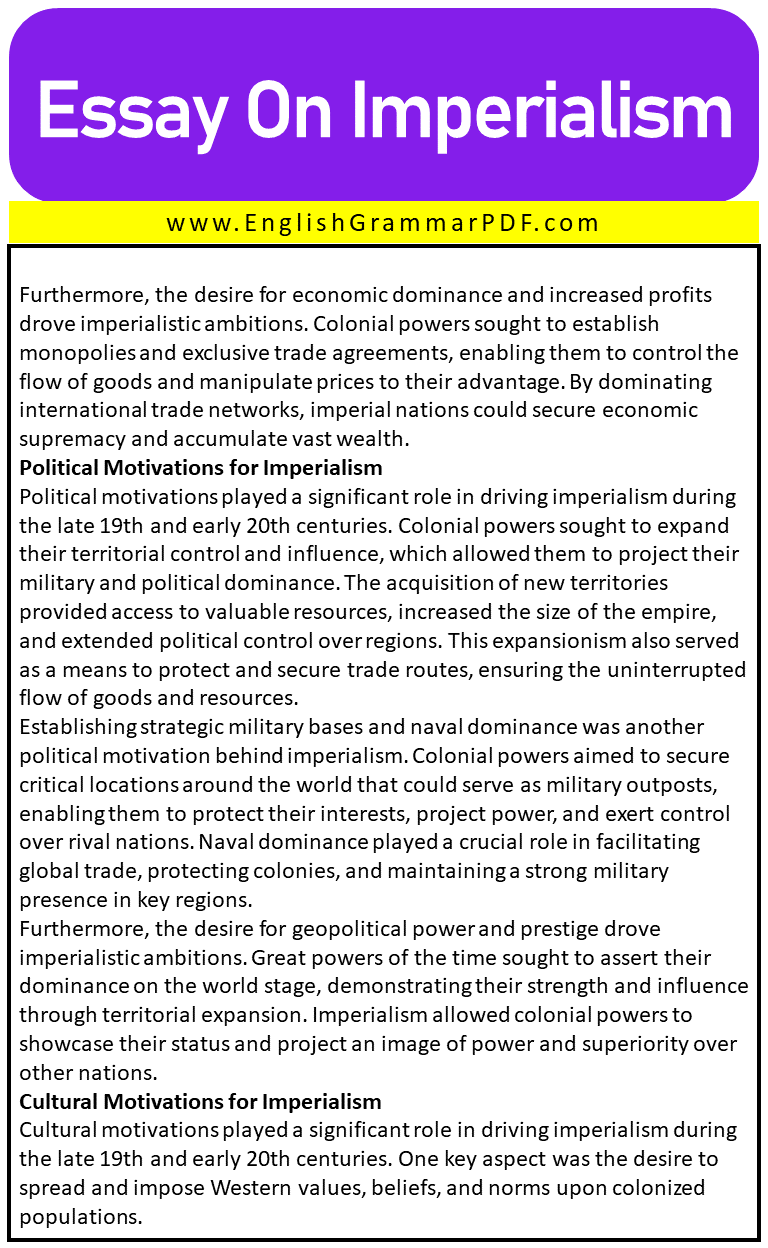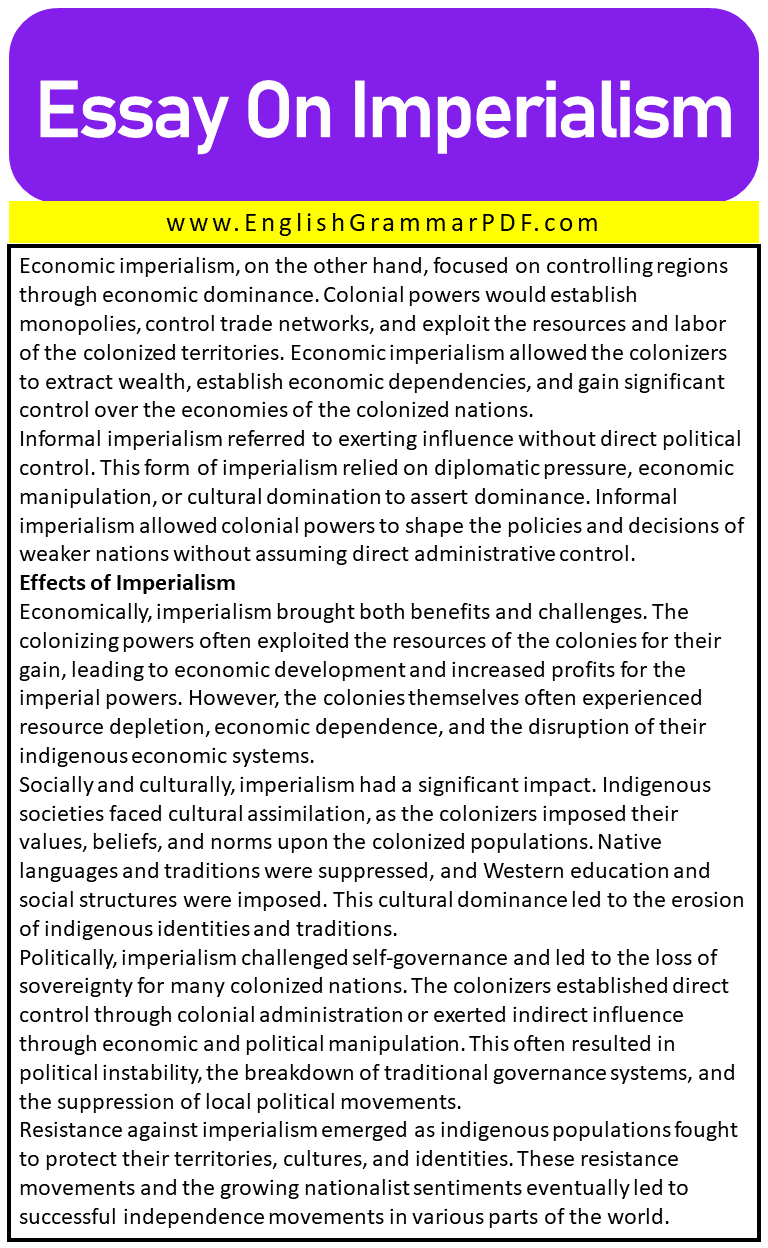Essay On Imperialism
Outline of Essay:
- Introduction
- Economic Motivations for Imperialism
- Political Motivations for Imperialism
- Cultural Motivations for Imperialism
- Forms of Imperialism
- Effects of Imperialism
- Critiques and Legacies of Imperialism
Introduction
Imperialism refers to the policy or practice of extending a nation’s power and influence through territorial acquisition, economic control, or cultural dominance over other regions or countries. The study of imperialism is crucial as it provides insights into the historical forces that have shaped the modern world. Imperialism emerged in the late 19th and early 20th centuries, fueled by various historical factors. The Industrial Revolution, which brought about technological advancements and increased production capabilities, created a demand for raw materials and new markets. Additionally, the growth of nationalism and the quest for national glory and power further contributed to the rise of imperialism. Colonial powers such as Britain, France, Germany, and the United States sought to expand their influence and control over territories around the world.
Economic Motivations for Imperialism
Economic motivations played a pivotal role in driving imperialism during the late 19th and early 20th centuries. The acquisition of natural resources and raw materials was a key objective for colonial powers. By establishing control over territories rich in valuable resources such as rubber, oil, minerals, and agricultural products, imperial nations could secure a steady supply for their industries and ensure a competitive advantage in the global market.
Imperialism also provided an opportunity for the opening of new markets. By expanding their territories, colonizing nations gained access to untapped consumer bases and potential trading partners. This facilitated the export of goods and services from the colonizing countries, leading to increased profits and economic growth.
Furthermore, the desire for economic dominance and increased profits drove imperialistic ambitions. Colonial powers sought to establish monopolies and exclusive trade agreements, enabling them to control the flow of goods and manipulate prices to their advantage. By dominating international trade networks, imperial nations could secure economic supremacy and accumulate vast wealth.
Political Motivations for Imperialism
Political motivations played a significant role in driving imperialism during the late 19th and early 20th centuries. Colonial powers sought to expand their territorial control and influence, which allowed them to project their military and political dominance. The acquisition of new territories provided access to valuable resources, increased the size of the empire, and extended political control over regions. This expansionism also served as a means to protect and secure trade routes, ensuring the uninterrupted flow of goods and resources.
Establishing strategic military bases and naval dominance was another political motivation behind imperialism. Colonial powers aimed to secure critical locations around the world that could serve as military outposts, enabling them to protect their interests, project power, and exert control over rival nations. Naval dominance played a crucial role in facilitating global trade, protecting colonies, and maintaining a strong military presence in key regions.
Furthermore, the desire for geopolitical power and prestige drove imperialistic ambitions. Great powers of the time sought to assert their dominance on the world stage, demonstrating their strength and influence through territorial expansion. Imperialism allowed colonial powers to showcase their status and project an image of power and superiority over other nations.
Cultural Motivations for Imperialism
Cultural motivations played a significant role in driving imperialism during the late 19th and early 20th centuries. One key aspect was the desire to spread and impose Western values, beliefs, and norms upon colonized populations.
Western powers believed that their culture was superior and sought to promote it as a model for civilization. This involved the imposition of Western languages, education systems, legal frameworks, and social customs upon indigenous peoples. The intention was to assimilate indigenous populations into the dominant Western culture, erasing their own cultural identities and traditions.
Missionary efforts also served as a cultural motivation for imperialism. Christian missionaries were sent to colonies to convert the local populations to Christianity. These missionaries often saw themselves as agents of civilization, bringing salvation and enlightenment to what they perceived as “uncivilized” people. Religious justifications were used to legitimize imperialistic endeavors, framing colonization as a divine mission.
The impact of imperialism on indigenous cultures and identities was profound. Many traditional customs, languages, and practices were suppressed or even banned. Indigenous populations were forced to abandon their cultural heritage and adopt Western ways of life. This led to a loss of cultural diversity and homogenization of societies under Western influence. The effects of cultural imperialism are still felt today, as many communities struggle to revive and preserve their unique cultural identities in the face of globalization and ongoing cultural hegemony.
Forms of Imperialism
Imperialism, as a multifaceted phenomenon, took on various forms throughout history. These different forms of imperialism reflected the strategies and goals of colonial powers seeking to expand their influence and control over other regions or countries. Three main forms of imperialism include colonial imperialism, economic imperialism, and informal imperialism.
Colonial imperialism involved direct control and administration of colonies. The colonizing nation would establish a formal governing structure over the colonized territory, often imposing its legal, political, and social systems. This form of imperialism aimed to establish direct political control, extract resources, and exploit the labor of the indigenous population.
Economic imperialism, on the other hand, focused on controlling regions through economic dominance. Colonial powers would establish monopolies, control trade networks, and exploit the resources and labor of the colonized territories. Economic imperialism allowed the colonizers to extract wealth, establish economic dependencies, and gain significant control over the economies of the colonized nations.
Informal imperialism referred to exerting influence without direct political control. This form of imperialism relied on diplomatic pressure, economic manipulation, or cultural domination to assert dominance. Informal imperialism allowed colonial powers to shape the policies and decisions of weaker nations without assuming direct administrative control.
Effects of Imperialism
Economically, imperialism brought both benefits and challenges. The colonizing powers often exploited the resources of the colonies for their gain, leading to economic development and increased profits for the imperial powers. However, the colonies themselves often experienced resource depletion, economic dependence, and the disruption of their indigenous economic systems.
Socially and culturally, imperialism had a significant impact. Indigenous societies faced cultural assimilation, as the colonizers imposed their values, beliefs, and norms upon the colonized populations. Native languages and traditions were suppressed, and Western education and social structures were imposed. This cultural dominance led to the erosion of indigenous identities and traditions.
Politically, imperialism challenged self-governance and led to the loss of sovereignty for many colonized nations. The colonizers established direct control through colonial administration or exerted indirect influence through economic and political manipulation. This often resulted in political instability, the breakdown of traditional governance systems, and the suppression of local political movements.
Resistance against imperialism emerged as indigenous populations fought to protect their territories, cultures, and identities. These resistance movements and the growing nationalist sentiments eventually led to successful independence movements in various parts of the world.
Imperialism was met with resistance from indigenous populations, who sought to protect their territories, cultures, and identities. Indigenous resistance movements emerged, challenging the oppressive rule of colonial powers.
Additionally, imperialism sparked the emergence of nationalist sentiments and movements, with individuals and groups advocating for self-determination and independence. Many successful independence movements, such as India’s struggle for freedom from British rule, showcased the power of resistance and nationalism against imperialistic forces.
Critiques and Legacies of Imperialism
Imperialism has faced numerous critiques for its exploitative nature and the detrimental effects it had on colonized nations. Critics argue that imperialism perpetuated economic exploitation, with colonial powers extracting valuable resources from their colonies while offering little in return.
This economic dominance often resulted in poverty, underdevelopment, and dependency on the colonized nations. Furthermore, imperialism imposed cultural hegemony, eroding indigenous traditions and identities while setting Western values and norms.
Another criticism of imperialism is the violation of human rights and the disregard for the well-being of indigenous populations. Imperial powers often suppressed local resistance movements, denied basic rights, and perpetuated racial hierarchies.
The legacies of imperialism are still evident today. Many post-colonial nations continue to struggle with the long-term consequences of imperialism, including political instability, economic disparities, and social divisions. The borders and boundaries imposed by colonial powers have often resulted in ongoing conflicts and tensions. Moreover, the cultural impact of imperialism can be seen in the lingering effects of Westernization and the erosion of traditional practices and languages.
FAQ’s
What is the main purpose of imperialism?
The main purpose of imperialism was to expand a nation’s power and influence through territorial acquisition, economic control, and cultural dominance over other regions or countries.
What are the major effects of imperialism?
The major effects of imperialism include economic exploitation, cultural assimilation, political subjugation, social disruption, and the long-term legacies of inequality, political instability, and cultural hybridity in post-colonial nations.
Explore More Essays:
Essay On Colour Of Personality
Download the PDF of the Essay:








